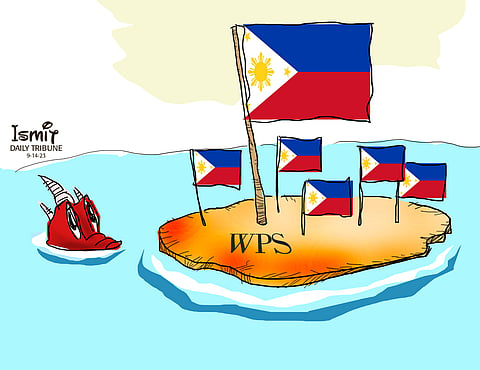
- NEWS
- the EDIT
- COMMENTARY
- BUSINESS
- LIFE
- SHOW
- ACTION
- GLOBAL GOALS
- SNAPS
- DYARYO TIRADA
- MORE

Discerning where the Philippines and China stand in the simmering territorial conflict requires returning to the arbitral ruling.
China has been dwelling on the false narrative that since it did not participate in the proceedings of the Permanent Court of Arbitration, or PCA, it can disregard its ruling.
The argument, thus, continues that since it was not a party to the process, then it is not bound to comply with the award, particularly since it had stated, being a signatory to the United Nations Convention on the Law of the Sea, that it would not subscribe to third-party arbitration.
Annex VII of UNCLOS, however, provides that the "absence of a party or failure of a party to defend its case shall not constitute a bar to the proceedings."
That portion of the Charter of the Oceans also provides that if a party does not participate in the proceedings, a tribunal "must satisfy itself not only that it has jurisdiction over the dispute but also that the claim is well founded in fact and law."
The PCA said in its award that throughout the proceedings, the Tribunal had taken steps to test the accuracy of the Philippines' claim, including by requesting further written submissions from the Philippines and questioning the Philippines both before and during two hearings.
UNCLOS also appointed independent experts to report to the Tribunal on technical matters, obtain historical evidence concerning features in the South China Sea, and provide this to the parties for comment.
According to PCA, China also made it clear through the publication of a position paper in December 2014 and other official statements that, in its view, the tribunal lacked jurisdiction in the dispute.
Article 288 of the Convention, however, states, "In the event of a dispute as to whether a court or tribunal has jurisdiction, the matter shall be settled by decision of that court or tribunal."
The PCA convened a hearing on jurisdiction and admissibility in July 2015 and rendered an award on 29 October 2015, deciding on some jurisdiction issues and deferring others for further consideration.
The PCA inquired on the issue of jurisdiction and found it had the authority to adjudicate.
The PCA argued the award was final and binding based on Article 296 of the Convention and Article 11 of Annex VII.
Regarding China's claim of historic rights and the "nine-dash line," the tribunal found it had jurisdiction, and it concluded that to the extent China had historic rights to resources in the waters of the South China Sea, such rights were extinguished.
The historic rights were invalidated since these were incompatible with the exclusive economic zones provided for in UNCLOS.
The Tribunal also noted that, although Chinese navigators and fishermen, as well as those of other States, had historically used the South China Sea islands, there was no evidence that China had historically exercised exclusive control over the waters or their resources.
"The Tribunal concluded that there was no legal basis for China to claim historic rights to resources within the sea areas falling within the 'nine-dash line,'" it added.
The violation of rights was not on the part of the Philippines, as China had claimed consistently, but the other way around.
Finding certain areas being within the exclusive economic zone of the Philippines, the Tribunal found that China had "violated the Philippines' sovereign rights in its exclusive economic zone by interfering with Philippine fishing and petroleum exploration, constructing artificial islands and failing to prevent Chinese fishermen from fishing in the zone."
The Tribunal held that Filipino fishermen (like those from China) had traditional fishing rights at Scarborough Shoal and that China had interfered with these rights by restricting access.
The Tribunal further held that Chinese law enforcement vessels had created a serious risk of collision when they physically obstructed Philippine vessels.
Based on UNCLOS, which China insisted on adhering to, its historic claims had no basis, regardless of its refusal to honor the PCA decision.
It is thus bound to follow what is provided in the International Convention, which is all there is to it in the maritime rift.
